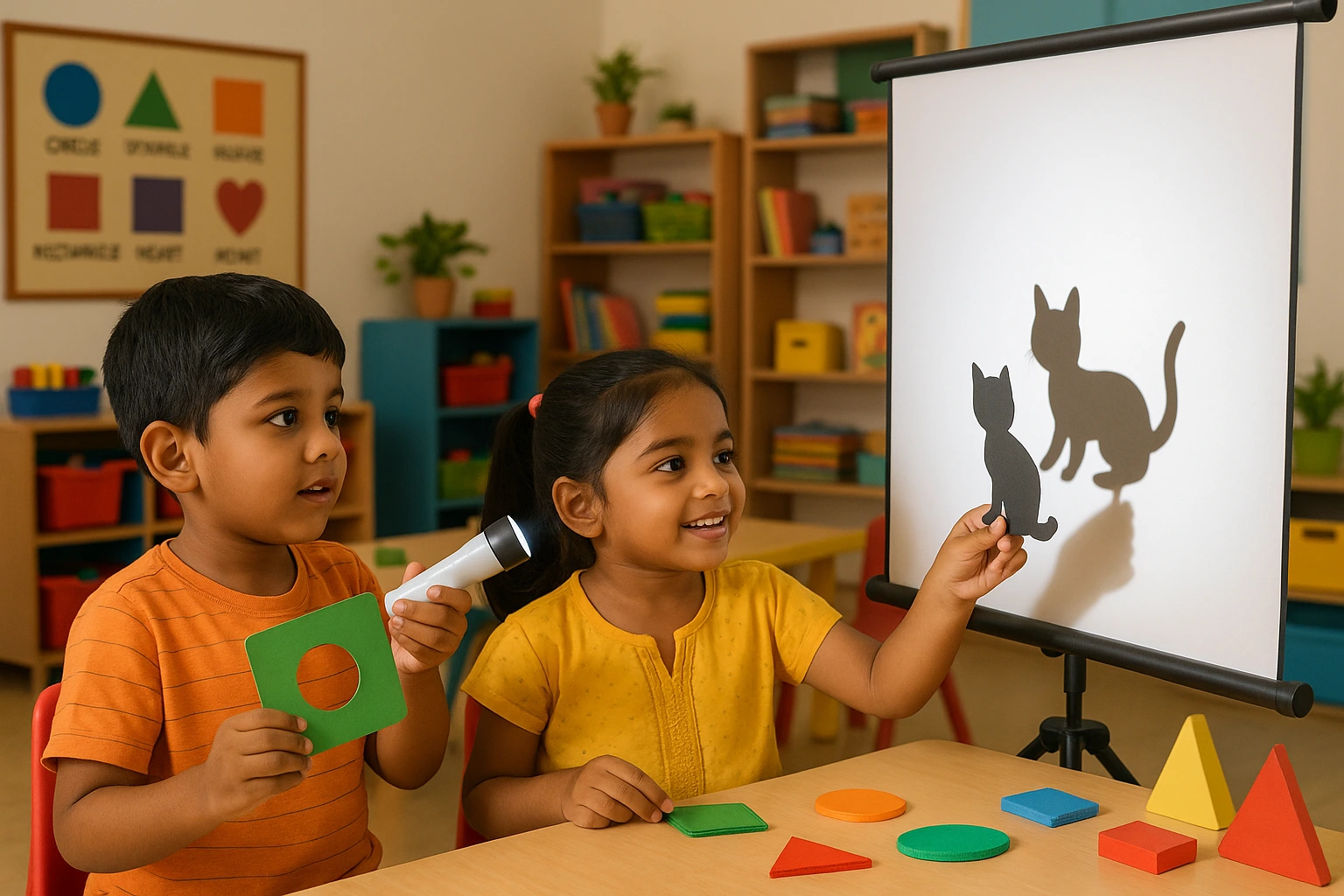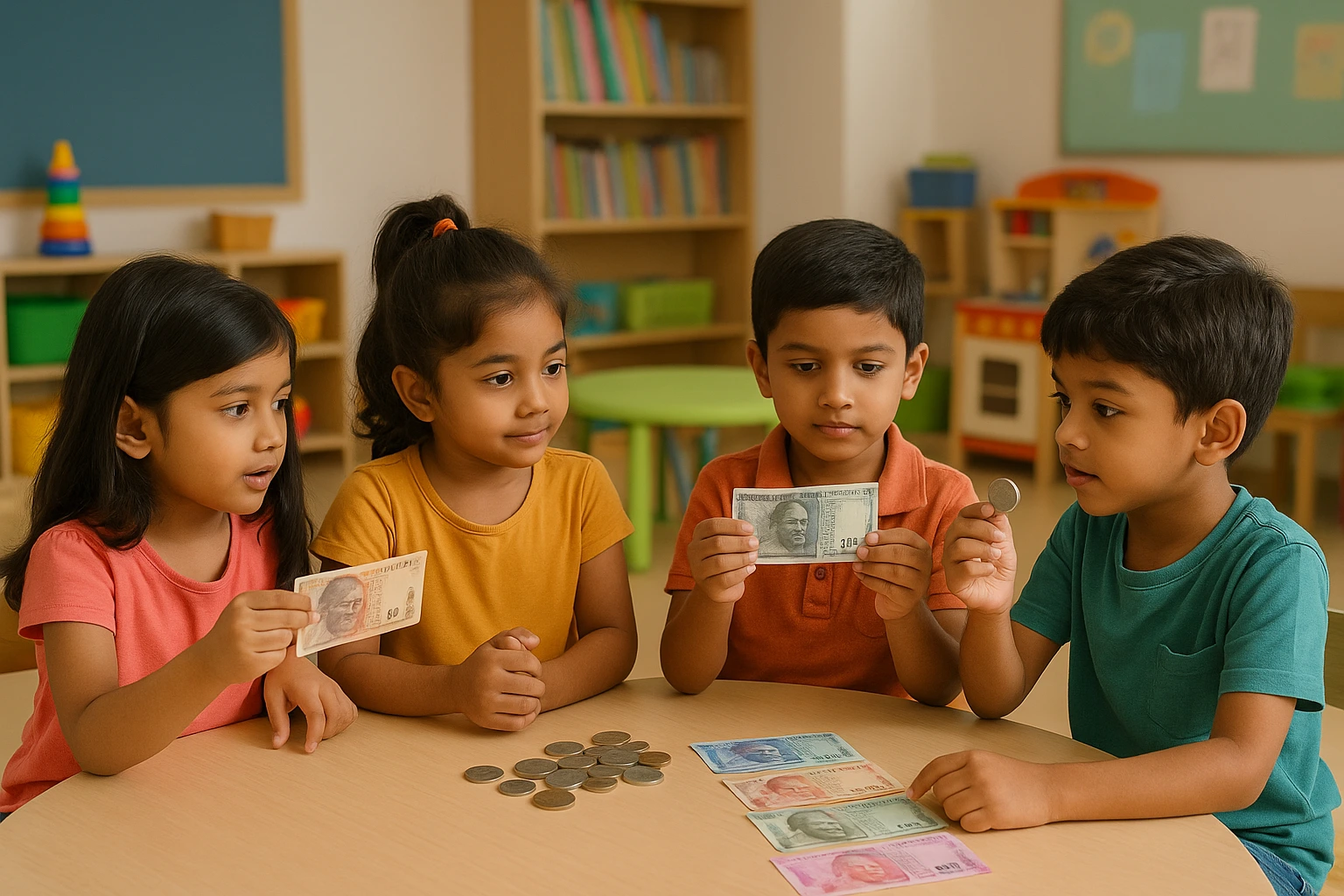What is a STEM Activity for Kindergarten?
What is a STEM Activity for Kindergarten?
STEM Activity for Kindergarten enable young people to learn about ideas in science, technology, engineering, and mathematics by challenge and acquisition while playing and problem-solving. STEM Activity for Kindergarten stimulate young curious minds to know how things work, think critically, and question. Some of the principles of STEM are looking at patterns, counting and measuring, cause and effect, learning about shapes and structure, and simply using imagination to find answers to problems.
Table of Content
Why are STEM Activities Important for Kindergarteners?
STEM Activities at an early age construct a significant learning experience beyond textbooks. For kindergarten children, they construct curiosity, confidence, and life skills that scaffold future learning.
Shape young lives—join Vidhyanidhi’s ECCE Course and make a real impact!
For downloading the brochure of ECCE Course, Click Here!
Call or Whatsapp on +919869546913 / +919869866277, for the details of ECCE Course!
Here’s why STEM Activity for Kindergarten hold such importance:
Encourage Problem-Solving Skills
Asking open ended questions, allowing them learn by mistakes and learn strategies by watching you think through challenges.
Promote Creativity and Innovation
Kids find new ways to ways to use common materials and communicate abstract ideas simply by using use science, technology, and engineering.
Develop Early Math and Science Understanding
Allowing kids to learn about their surroundings with the use of measurements, patterns, and experiments, observation and numbers. Kids learn to solve problem, exercising curiosity and inquisitiveness are prioritized over information absorption.
Boost Confidence through Hands-On Learning
Learning by doing builds confidence by showing kids that hard work pays off. Instead of just trying to be right, it makes them think, try again, and help each other.
Encourage Teamwork and Communication
Help children practice co-ordination and communication by letting them collaborate in small groups, on activities like puzzles, block-building, or STEM challenges.
Lay a Foundation for Future Learning
Exposing younger children to STEM that fosters curiosity and which lays the foundation for children to learn more advanced ideas later in grades.
STEM Activity for Kindergarten provides with problem-solving, creativity, and cooperation skills while learning becomes engaging and relevant.
How do you Introduce STEMS to Kindergarten?
Children acquire knowledge most effectively when they discover, make, and wonder about what they are doing. The main thing is to lace up the children’s daily life with STEM concepts so that the learning becomes connected to their own view of the world. Little learners can be uncomplicated and playful while receiving STEM. Vidhyanidhi Education Society (Govt. Regd.) provides an Early Childhood Care and Education Program which prepares the teachers to embed STEM in enjoyable and purposeful ways.
Here are a few effective ways to introduce STEM in kindergarten:
- Hands-On Play: Children learn about balance, patterns, and how to solve problem when doing, activities such as constructing blocks, playing with puzzles, or making things with any substance.
- Nature Exploration: Keep children engaged in elementary school by making kids observe plants, weather changes, or observing insect which sparks interest in the environment.
- Storytelling with Numbers and Shapes: Counting, measuring, or recognizing shapes in stories will assist children in developing their early conceptual understanding of mathematics.
- Simple Experiments: Simple activities such as mixing colors, or testing objects that sink or swim. encourage observation and reasoning skills.
- Technology Integration: Kid-friendly technology, such as interactive games or digital drawing apps, to include technology in young children’s engaging early learning.
Through the Early Childhood Care and Education Course, teachers learn to plan age- appropriate activities that engage students’ curiosity. After finishing the course in Early Childhood Care and Education, teachers will have acquired the necessary skills for preparing developmentally suitable, interesting classrooms which will have naturally integrated STEM Activity for Kindergarten but without the teacher directly delivering a STEM-based lesson
For downloading the brochure of ECCE Course, Click Here!
Call or Whatsapp on +919869546913 / +919869866277, for the details of ECCE Course!

Examples of STEM Activities for Kindergarten
Children are inherently curious, they wonder and they ask questions about how things are. To foster that curiosity, appropriate STEM activities for kindergarteners are introduced, which help them construct knowledge of important ideas in science, technology, engineering, and math through play type investigations and problem-solving.
Here are some engaging examples:
- Nature Scavenger Hunt – Make kids go outside and collect leaves, flowers, or rocks to sort and once they’re back in class. This can develop their observation skills as well as expose students to simple biology.
- Classroom Weather Chart – Recording daily weather helps children connect patterns to real-life decisions like clothing or outdoor play.
- Seed Planting – Seed planting creates an opportunity for children to observe seeds growing under different conditions and experience their curiosities about the life cycle of seeds and simple experiments.
- Ice Age Dinos- Allow kids to freeze toy dinosaurs in ice and let them to think about how to unfreeze them, which helps to solving problem and science concepts.
- Building Block Challenges- Activities where children use blocks to solve a problem, create something specific, or test their ideas. These challenges go beyond free play by giving kids a goal, constraint, or problem to solve.
- Shadow Play- Kids can use shapes, animals and paper. Allowing kids to learn how things move and fit in space.
- Sink or Float- Experimenting which objects float builds an early understanding of density and enthusiasm.
- Toothpick or Marshmallow Structures- Simple construction projects spark creativity while teaching balance and design.
- STEM activities that encourage curiosity can turn regular play into valuable lessons when you use critical thinking.
Adding these activities for a kindergartener shows how a normal playtime can turn into important lessons that make kids curious and think about things.
Science
Through discovery and experiments kids learn about the world. It encourages curiosity, passion to explore, and ask questions that are answered through observation and experiments. Science explains about day-to-day life experience, from the air we breathe to the stars in the sky; science explains everyday experience in a simple way.
Examples of science in daily life include:
- Weather – To understand why temperature fluctuates, how clouds are created and how it rains, why the sun is hot.
- Plants and Animals – Providing opportunities for inquiry-based learning about plant growth and survival of animals in various habitats, through learning about germination, growth, photosynthesis, the plant growth process, and how animals survive in various habitats.
- Human Body – Learning about different parts of the human body, how they work, and how we use food to energize ourselves.
- Simple Experiments – Learning about simple experiments about how heart pumps and why we breathe.
Science is important because it:
- Encourages Curiosity – science-based education creates opportunities for young kids to ask “why” and “how” and allows their brains to start developing critical reasoning.
- Explains the World – science explains how nature works and everyday processes.
- Promotes Problem-Solving – science experiments can challenge kids to test their own hypotheses and solutions.
- Supports Innovation – scientific advances keep us on the cutting edge of new technology (improving our quality of life).
Science develops inquisitiveness and allows individuals to comprehend what’s around them for future exploration
For downloading the brochure of ECCE Course, Click Here!
Call or Whatsapp on +919869546913 / +919869866277, for the details of ECCE Course!
Source: hesston
Technology
Technology is the application of scientific knowledge to create innovative, advanced machinery, tools, or systems to improve the standards of living and solve problems. Technology has been a part of daily life for centuries from things such as the invention of the wheel to developing advanced technology in mobile smart devices.
For children, technology is knowing and understanding how it improves their way of living and the ways they will live and learn in the future.
Examples of technology include:
- Phones – Connect people instantly, share information, and learn on the go.
- Computers – Employed within schools, offices, and homes for learning, creating, and solving problems.
- Wheels – One of the oldest inventions that changed how humans travel and transport goods.
- Washing Machines – Helping hand to automate household chores which saves time and effort.
Technology plays an important role in:
- Education – Digital tools make learning interactive and accessible.
- Healthcare – Different kinds of Machines and software support diagnosis and treatment.
- Communication – Types of devices allow people to connect across the world.
- Daily Living – Everyday task of taking care of self and manage everyday activities.
Technology provides accessibility, keeps time, and leads to technological advances. Whether it’s certain simpler devices to more complex technologies, technology explicitly changes the way people live, work, and learn.
Engineering
Engineering is the process of imagining, making and improving ways to resolve problems. It is made up of a creative thought process along with applied skills to create a better, safer, and more comfortable life. Engineers are continually looking for ways to produce new solutions that impact our daily lives, from something as small as a convenient tool, to complex engineering systems.
Examples of engineering in action include:
- Bridges and Roads – Bridges and roads are made to connect people and places.
- Buildings – Buildings are made to be safe places to live, go to school, and work.
- Vehicles – Vehicles are things like cars, trains, and planes that are made to make travel faster and easier.
- Everyday Items – Engineering ideas have led to everyday things like chairs, toys, and even pencils.
Engineering is important because it:
- Solves Problems – To solve problems in the real world, engineers have to think critically.
- Improves Safety – Engineering saves lives. Instructive warnings, seatbelts, and earthquake-proof buildings.
- Encourages Creativity – Engineering is collaboration between imagination and what can be done with it.
- Shapes the Future – Engineering makes renewable energy, smart technology, and space travel possible.
Engineering completes all different parts of our lives. It helps to build communities that are simply better, makes excellent advances in technology, and creates a more sustainable future for the world.
For downloading the brochure of ECCE Course, Click Here!
Call or Whatsapp on +919869546913 / +919869866277, for the details of ECCE Course!

Math
Math is everywhere and we use it every day to study numbers, shapes, patterns, and measurements. Math helps us make sense of the world, solve problems and make decisions. Counting is simple and basic math is everywhere. The studies become more complicated as you need to begin to make more difficult calculations at each age.
Examples of math in daily life include:
- Counting Money – Understanding what are coins and notes used, how it helps in buying and selling.
- Measuring Ingredients – Proper measured ingredients is an essential step in cooking to maintain balance and taste.
- Telling Time – Reading clocks to manage routines.
- Shapes and Patterns – Found in buildings, art, and nature.
Math is important because it:
- Develops Logical Thinking – Solving problem becomes much easier.
- Improves Decision-Making – Numbers help people compare, plan, and budget.
- Supports Learning in Other Subjects – Science, engineering, and technology rely on math skills.
- Builds Confidence – Giving sense of achievements when solving puzzles or sums.
Math is an everyday device that can help people organize, understand, and impact their world; it is more than just numbers on a page. Early practice will boost children’s confidence and ability to use math in any situation.
Shape young lives—join Vidhyanidhi’s ECCE Course and make a real impact!
For downloading the brochure of ECCE Course, Click Here!
Call or Whatsapp on +919869546913 / +919869866277, for the details of ECCE Course!
FAQs
What is the STEM Game for Kids?
STEM games is fun, hands-on activity or digital game, which helps kids to learn about adventure that includes science, technology, engineering, and math while playing. These games helps to solve problem, think, and build.
How to Explain STEM to Kindergarten?
STEM is learning about how things work through play, building, counting, and exploring. Vidhyanidhi Education Society trains teachers to do this effectively.






